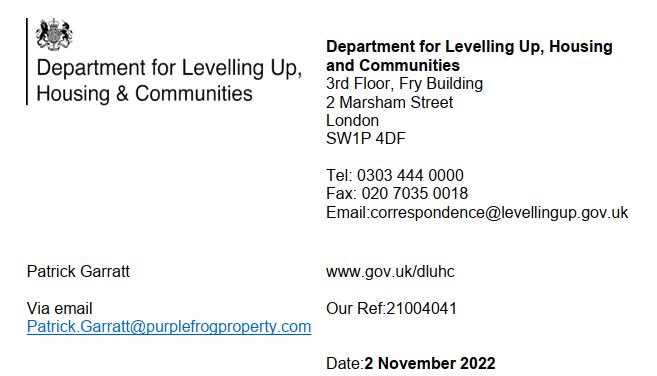Back in September, we wrote a response to the governments Renters’ Reform white paper, to which we have now received a generic reply.
The full response is below, however, this is the highlight concerning student accommodation:
“We understand that you are concerned about the impact these reforms will have on the student accommodation market. However, while we expect most students will continue to move in line with the academic year, they may equally face circumstances beyond their control and need to vacate a property early or be locked into contracts for poor quality housing. Responses to our consultation also showed that the student population is diverse – some students have families, local roots, live with non-students, or have other reasons why they may wish to remain in the property. ”
“Since the publication of the White Paper, the Department has continued to engage with student accommodation stakeholders. We know that some landlords are concerned about how the new tenancy system will work for students, and we are considering how we can best support the student lettings market.”
Dear Patrick Garratt,
Thank you for your email of 14 September about the planned reforms to the private
rented sector and the impact on the student accommodation market. Your letter has
been forwarded to officials in the Department for response. We apologise for the
delay in responding.
As you are aware, we published a White Paper on 16 June 2022 setting out our
plans to fundamentally reform the private rented sector and level up housing across
the country. Our reforms will provide more secure and high-quality homes and create
a stable rental market for landlords to remain and invest in. We are committed to
introducing a Renters Reform Bill to deliver this change. The White Paper can be
found here: https://www.gov.uk/government/publications/a-fairer-private-rentedsector.
We recognise that landlords need confidence that they can regain possession of
their properties when necessary. We will reform the possession grounds for
landlords, introducing new and stronger grounds for repeated incidences of rent
arrears, and allowing landlords to end tenancies to sell or move into their properties.
We will reduce the notice periods for anti-social behaviour, and explore prioritisation
in the courts with the Judiciary, ensuring landlords can take swift action when
needed.
We understand that you are concerned about the impact these reforms will have on
the student accommodation market. However, while we expect most students will
continue to move in line with the academic year, they may equally face
circumstances beyond their control and need to vacate a property early or be locked
into contracts for poor quality housing. Responses to our consultation also showed
that the student population is diverse – some students have families, local roots, live
with non-students, or have other reasons why they may wish to remain in the
property.
Since the publication of the White Paper, the Department has continued to engage
with student accommodation stakeholders. We know that some landlords are
concerned about how the new tenancy system will work for students, and we are
considering how we can best support the student lettings market
We will allow time for a smooth transition to the new system, providing time for the
market to adjust, while making sure that tenants can benefit from the new system as
soon as possible. We will implement the new system in two stages, providing at least
six months’ notice of our first implementation date, after which all new tenancies will
be periodic and governed by the new rules. All existing tenancies will transition to the
new system on a second implementation date, and we will allow at least twelve
months between the first and second dates. Specific timings will depend on when
Royal Assent is secured.
Further detail on the planned reforms to the tenancy system following the removal of
Section 21 can be found in the government response to our consultation ‘A New Deal for Renting’.
We will continue to talk to those affected across the sector,
including landlords renting to students, as we develop our reforms.
Private Purpose Built Student Accommodation (PBSA) landlords have a distinct
business model that is more reflective of university managed accommodation, with
accommodation often only able to be used by students. Tenants do not have an
expectation of a long-term home. Therefore, we will exempt private PBSA who have
joined government approved codes of practice from our tenancy regime. These
codes set vigorous standards for the safety of student accommodation, the
management of the property and the relationship between managers and student
tenants.
We note that your letter raised concerns about powers available to deal with antisocial behaviour.
The Government recognises that antisocial behaviour causes
disruption and distress to the lives of victims, neighbours and the community, and
can cause damage to the landlord’s property. The Government is working to ensure
the court process works for landlords who need to evict a tenant engaging in ASB.
We are reducing notice periods for the most serious ASB cases, working to prioritise
ASB cases in court, and publishing new guidance for landlords on identifying and
dealing with ASB. It is only fair that a tenant accused of ASB has the right to a fair
hearing to establish if ASB took place, in which case the judge can grant an
eviction.
We hope you find this information helpful and thank you for writing on this important
matter.
Yours sincerely,
Private Rented Sector Division
Department for Levelling up, Housing & Communities

